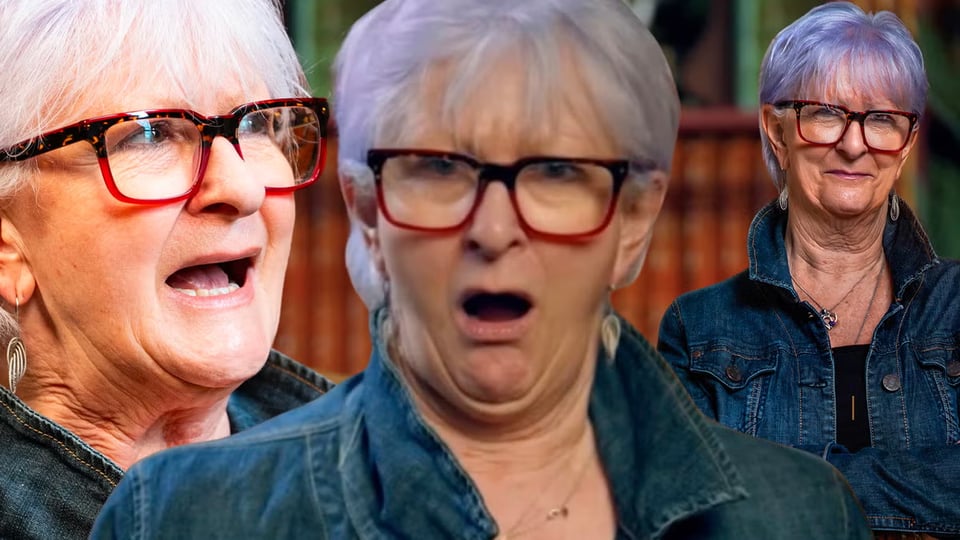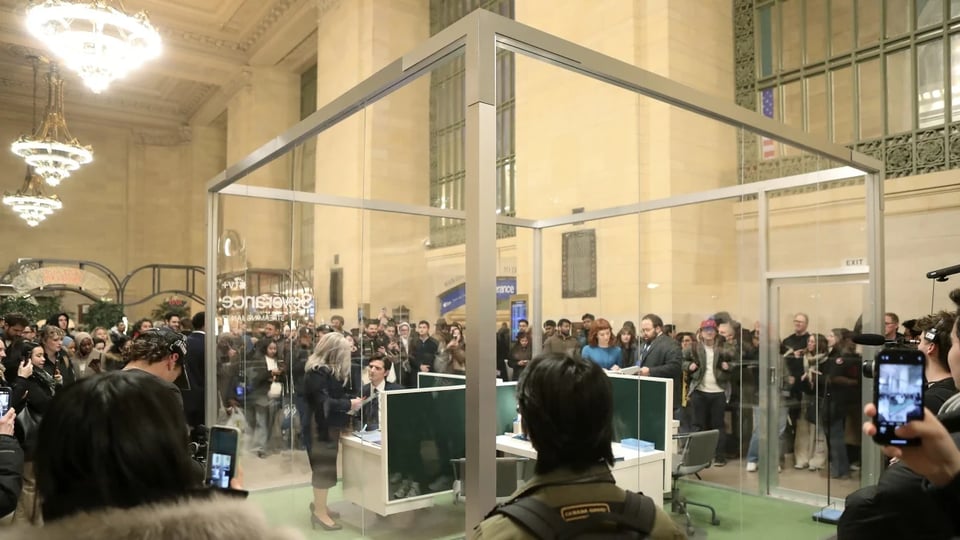FRESH MINDS #006
February 2025
How has the second month of the year been treating you?
Us? As ever, we’ve been busy scheming behind the scenes.
Zoe joined the APG’s Arrive and Thrive event, meeting a lot of likeminded keen Junior strats.
Here are some key points that are likely relevant throughout a strategist’s career:
Ask for help when you don’t know something.
Read! Anything and everything.
If you’re not getting paid enough, move on!
Network!
No matter the role or seniority you have, networking and meeting folks is always key. So we’ll be sure to continue bringing Juniors people together — keep an eye out for April .
We’ve sign-posted more great Junior training opportunities at the end of this edition.
Let’s hear about this months topics:
We’ve found the only person who wasn’t a fan of Traitors
Why brands should consider scent
What brands can learn from Severance’s marketing
Is being delulu the new selulu?
Happy reading!
Stay breezy,
A&Z


“The only insights to be taken from the show are what they did, from marketing to cast selection”
Having been convinced to watch The Traitors by a friend at work, I watched the first episode of the latest season with high hopes that it would not just be another drab take on reality TV.
Spoiler: it was.
A cast so carefully curated by psychologists that I felt like they were forcing me to try and enjoy it. Halfway through the first episode, I questioned whether to cancel my Spotify subscription and listen to ads on repeat instead- at least, that was within my control.
Psychologists working in film and media are nothing new; the same can be said about advertising and marketing. The best adverts and brands draw on their audience's psyches in such a way that the audience doesn’t notice how they are being influenced in their purchasing decisions. Apple uses the scarcity and framing effect to make their products so in demand, nobody needs a new iPhone every year… While McDonald’s well-known red and yellow trigger us to feel happiness and hunger, yes, you can use that as an excuse the next time you are munching down on a Big Mac. The beauty of both these examples is that most of us don’t even realise what we’re being made to feel. That is where The Traitors fell down for me.
You may have drawn some insights into human behaviour from The Traitors or simply just enjoyed the carefully curated spectacle they put on. That is exactly what the psychologists behind the show wanted you to do. The reality is the only insights to be taken from the show are what they did, from marketing to cast selection, to make the finale the most viewed episode in the show’s history.
Now I am not saying don’t enjoy it, we all need an escape from our day to day lives and a much anticipated TV show is the perfect way to do that. I will however leave you with a few questions to ponder:
• What psychological tricks can you use on your next project to reach your audience?
• How did you feel watching The Traitors, and why do you think they were so successful in making you feel that way?
• Have you also seen any adverts/campaigns/TV shows that were so unsubtle in trying to influence you that they left you with more adverse feelings about the brand? And if so, where did they go wrong?
- Lara Account Executive/PhD Student

“In the corporate world, delusion seems to win.“
Why being delusional is taking over social media...
Once upon a time, being delusional was an insult. Now? It’s a mindset Gen Z has embraced as admirable. We’ve taken delusional confidence - believing in yourself with zero evidence - and turned it into a blueprint for success.
Manifestation? That's just strategic delusion.
Shooting your shot at a job you're under-qualified for? Classic delulu behaviour.
The idea is simple: act like you belong and eventually, reality catches up. Take TikTok influencer Alix Earle, who went from a student to a global beauty influencer by posting like she already was one. Or those who apply for roles beyond their experience, present themselves as the perfect fit, and actually get hired - wishful thinking or a self-fulfilling prophecy?
In the corporate world, delusion seems to win. A study showed that people who overestimate their abilities are more likely to get promoted than those who accurately assess themselves. Why? Because confidence sells!
Of course, delulu has its limits. No amount of self-belief can turn you into a brain surgeon overnight. But in a world where hesitation and overthinking holds people back, believing in your own hype might be the smartest move to make.
So is delulu the new solulu? Maybe. If you believe in your abilities, take the risk and back yourself even when others doubt you, it might just be the decision that pushes you towards success.
- Tash White, Media, Marketing and Communciations Executive at Next-Gen Media

“Sensory marketing isn’t just a nice-to-have, it’s the secret to standing out”
In 2025, we’re no longer just buying products; we’re buying experiences, moods, and cravings aka sensory marketing. Engaging our sight, scent, taste and feel, at its core, this approach is all about making you feel a product before you even own it - a huge win for brands in a digital-first world where touch and smell aren’t always part of the equation.
Rhode is leading the charge in gourmandising their marketing, from their glazed donut skin to cinnamon bun-scented launches, their product lines are so mouthwatering their Instagram feed could pass as a mom-and-pop bakery. Gisou’s honey-infused hair campaign dripped golden sweetness over the ski slopes of Aspen, while Loewe turned its cult-favourite tomato candle into a luxury bag, blurring the lines between product, art, and sensory escapism. And most recently, Glossier’s viral Black Cherry Balm (following in the footsteps of Clinique's viral Black Honey lip product) is offering a juicy, retro nod to sticky-sweet indulgence.
But why does it work? Sensory marketing taps directly into our Psychology. Visual and scent-driven cues, like honey, warm bread and berries, triggers the brain’s reward system, making the products essentially irresistible. Comfort-driven scents also tap into our primal indulgences and nostalgia, creating a deeper emotional connection to the brand. In (vanilla) essence, these campaigns create a multisensory experience for the consumer, making the product more memorable and leaving them hungry for more.
In an increasingly saturated landscape, sensory marketing isn’t just a nice-to-have, it’s the secret to standing out. By seamlessly blending the lines between need and want, it turns customers into lifelong fans. As Meghan Flynn, TFG’s director of public relations, puts it: “In the end, implementing a sensory-driven approach for a more complete customer experience can only give your brand greater impact.”
So, in 2025, it’s not just about selling - it’s about making your audience crave what they never knew they needed.
This trend isn’t just growing; it’s deliciously unstoppable.
- Georgina Kelly, Global Marketing Executive at Imagination, a Global Experience Design agency


“When brands want to take part in cultural conversations, they have to look inwards“
Working in the experiential space, it’s interesting to see how brands, luxury in particular, are starting to attach themselves to cultural avenues like art, music, literature, philosophy which often manifests in the forms of pop-ups or private cultural clubs. However, these are starting to look disingenuous to me as what they’re essentially doing is using the IP of other artists and slapping their brand name next to it and calling it a day. And maybe what I’m about to say next is a bit unfair.
Apple TV’s hit show Severance is hitting the right notes with their marketing of their second season. I mean, who didn’t love their pop up at Grand Central Terminal in New York City? They’ve inserted themselves into the conversation around art by essentially creating performance art as the actors walk around the glass cubicle in character. Raise brand awareness, tick.
If you’re a fan of the show like me, you’d know that the protagonist’s brother-in-law Dr. Ricken Lazlo published a self-help book that was read religiously by the protagonist’s ‘innie’ and his friends, called ‘The You You Are’. What did Apple do? They released eight chapters of it as a digital and audiobook. Engage with your loyal fanbase, tick.
I say that my criticism above is unfair because Severance has their own IP to use and express in different forms of art (performance art and literature…so far) while brands in general don’t, besides maybe their heritage story. Nonetheless, my point still stands that when brands want to take part in cultural conversations, they have to look inwards and produce something that truly expresses their personality in a way that’s original and un-bandwagon-y.
- Ally Azizi, Junior Strategist
Resources & tips from our FRESH community:
Check out the APG’s Night School — Across 8 online evening sessions, this course covers the most important tasks and skills Junior Strategists need at the start of their careers. Taught by a fab bunch of Senior Strats, the course is accessible to non-APG members and will run in April, May and June. You can ask your agency for funding — if you need help building a case, we’re happy to help proof-read!
Thanks for supporting FRESH MINDS
Have some POVs to share? Check out the next month’s prompts HERE.
We’d love to hear your feedback: freshminds2024@gmail.com